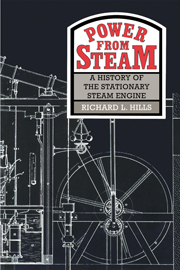Book contents
- Frontmatter
- Contents
- Preface
- Acknowledgements
- List of figures
- List of tables
- 1 The noblest machine
- 2 The impellent force of fire
- 3 Common old smoaking engines
- 4 The economy of power
- 5 The devil of rotations
- 6 Such unbounded power
- 7 Good servants but bad masters
- 8 An uncultivated field
- 9 The new theory of heat
- 10 The internal operation of the machine
- 11 Such absolute smoothness
- 12 Twinkle twinkle little arc
- 13 The drive for efficiency
- 14 An economical source of motive power
- 15 The most economical mode of obtaining power
- Notes
- Bibliography
- Index
2 - The impellent force of fire
The first steam engines, Savery, Newcomen (1600–1730)
Published online by Cambridge University Press: 01 June 2011
- Frontmatter
- Contents
- Preface
- Acknowledgements
- List of figures
- List of tables
- 1 The noblest machine
- 2 The impellent force of fire
- 3 Common old smoaking engines
- 4 The economy of power
- 5 The devil of rotations
- 6 Such unbounded power
- 7 Good servants but bad masters
- 8 An uncultivated field
- 9 The new theory of heat
- 10 The internal operation of the machine
- 11 Such absolute smoothness
- 12 Twinkle twinkle little arc
- 13 The drive for efficiency
- 14 An economical source of motive power
- 15 The most economical mode of obtaining power
- Notes
- Bibliography
- Index
Summary
For hundreds of years, people have played about with steam toys. Around AD 100, Hero of Alexandria described the ‘Aeolipyle’, a primitive form of reaction turbine. Then the Greeks arranged that, in their temples, doors should open suddenly to reveal the god after the worshipper had lit a fire on the altar. The fire heated water in a closed ‘boiler’ so that, when it boiled, it was forced through a pipe into a bucket, rather like the present day ‘Teasmade’. The extra weight in the bucket caused it to drop and so open the doors.
The first attempts
After 1600, there was renewed interest in the properties of steam but, at first, this was mainly an intellectual pursuit. We can trace two lines of development, one in which the pressure of the steam was applied against the surface of water to force that water up a pipe, and the other in which the steam pushed against a piston. Salomon de Caus came to England around 1609 and was involved in designing gardens at Hatfield House and Greenwich Palace where fountains were laid out. One idea he published for creating fountains was to fill a copper sphere with water and to heat it. A pipe with a control valve reached nearly to the bottom of the sphere so that, when steam pressure rose inside, water would be squirted out of the pipe. There do not appear to have been any safety valves, water level indicators or other safety features which we would consider necessary today.
- Type
- Chapter
- Information
- Power from SteamA History of the Stationary Steam Engine, pp. 13 - 30Publisher: Cambridge University PressPrint publication year: 1989



